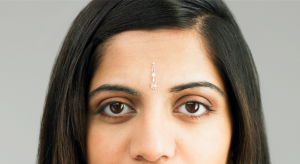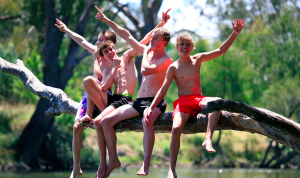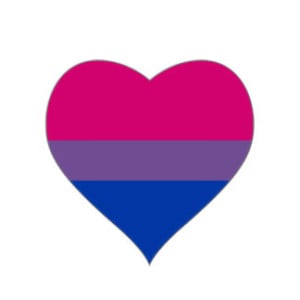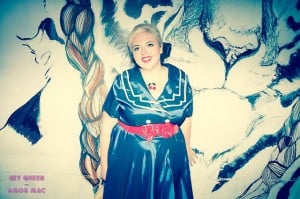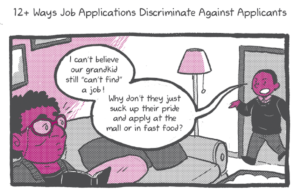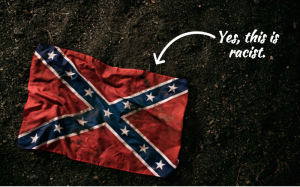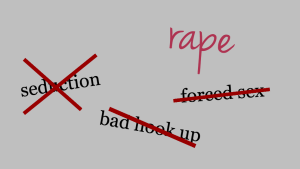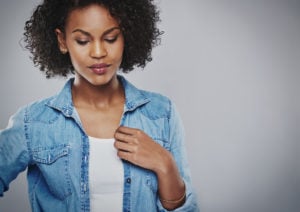“Ally” is a complicated – and at times, problematic – term. But whatever you call it, one thing is true: Many marginalized people feel safer, more hopeful, and more accepted thanks to their allies.
For many queer women, our straight female allies are a source of support and solidarity. Because even though there are aspects of our experiences that they can’t relate to, they know what it’s like to have one’s sexuality policed and stigmatized, to face male violence, and to have one’s own boundaries and preferences constantly disregarded or treated as irrelevant.
My straight female friends have been there for me through all of it: the struggle to find a label that works, the loneliness when it felt impossible to find someone to date, the awkwardness of OKCupid dates. I love them, and I wouldn’t be where I am now without them.
But sometimes, it’s not all sunshine and rainbows and solidarity.
Most queer women have stories of things straight women have said or done that stung unexpectedly, that casually wore down our senses of self.
Some of those things we would’ve resignedly expected from straight men – but coming from women, they were powerfully painful.
At those times, we realize that there are aspects of our experience that straight women cannot understand, no matter how much else we might have in common.
In her piece about straight women, queer women, and microaggressions, Ashley Truong writes,
It’s important to talk about the ways in which straight women can make queer women uncomfortable. Nobody should feel uncomfortable, and more importantly, when we make queer women feel uncomfortable, we exclude them. We exclude them not only from feminist movements, but also from friendships.”
Truong shows us that inclusion isn’t just about who can get married and who sees themselves represented in the media, although those things are incredibly important.
Inclusion is also about whether or not we feel like the people in our lives understand and support us.
While our straight female friends certainly care a lot and have our best interests in mind, they might not realize that they still have a few things to learn.
Truong’s piece discussed things straight women say; I’d like to expand on that and talk about things they do and beliefs that they hold.
By deconstructing some of these dynamics, I hope to inspire straight women to find better ways to relate to and support their queer female friends.
So here are five ways you can be a better ally to queer women.
1. Ask for Consent Before Touching Us (Just Like You Should with Anyone)
Most queer women I know have stories of straight women touching them without consent – often in ways that read to us as very sexual, and ways that they would (rightfully) be furious if men touched them.
Maybe it’s because we feel “safe” to them, and they feel comfortable expressing affection or attraction to us in ways that they don’t feel comfortable doing with men.
But maybe it’s because they like having that feeling of power over someone.
It’s probably true that if a woman touches another woman, that’s less likely to be interpreted as a come-on than when she touches a man.
Of course, interpreting innocent gestures as evidence of sexual interest is problematic and contributes to a culture that minimizes the importance of consent and explicit communication.
However, when women assume that there’s no chance that another woman would ever interpret a touch in a sexual way – not even when they touch her breasts or butt – they desexualize her.
To these women, touching men can be a sexual gesture; touching women cannot.
Straight women touch us in these ways while insisting that there’s no need to ask for consent because there’s nothing sexual about it. But consent isn’t just for “sexual” touching (as if you can really separate that from any other kind).
In doing so, they make the assumption that unlike straight men, who presumably treat this type of contact as a sign of sexual interest, queer women don’t really have those desires.
There’s no chance that they’ll misinterpret your touch as a come-on. And if they do, that’s their fault, not yours.
When straight women casually touch me in intimate ways without asking first, it hurts. Not only because I wasn’t given the chance to consent, but because they don’t understand that for me, these types of touches are something to share with a partner.
They’re sexually charged and erotic. It’s an interaction that’s supposed to happen in bed with someone I’m into, not at the bar where you’ve decided that my butt is “soooo cute!” that you want to grab it without asking.
2. Let Us Define and Express Our Sexuality for Ourselves
I’ll never forget the time in college when I met a fellow queer girl for possibly the first time ever and came out to her.
It should’ve been a great moment, but my then-best friend decided that was a good time to police my identity. “Oh, but you’re not like, really bi,” she said, right in front of the person I was hoping to connect with. Later, when I called her out, she dismissed my concerns with a reminder that she’s “an ally.”
That’s not the only way our straight friends can unintentionally police us and speak for us.
Many of us have also faced pressure from straight allies to come out before we were ready to or with labels that we don’t actually identify with.
It’s tempting to try to affirm a friend’s recent same-sex experience by encouraging her to come out as a lesbian, but that experience doesn’t mean she actually is.
She could be bi or pan, she could be a straight woman who just wanted to see what sleeping with a woman would be like, she could be a non-straight woman who isn’t comfortable with any labels, or she could just not be ready to come out as anything at all.
Allies: When it comes to labels, follow our lead. Even when it doesn’t make sense to you, and even when you personally think there’s another label that fits us better. It’s not your call.
And remember that coming out is still emotionally and/or physically dangerous for many queer people, especially women, trans folks, and queer people of color. You can affirm your queer friend’s identity without pressuring them to share it with the whole world if they don’t want to.
3. Don’t Assume We’re Hopelessly in Love with You (Or Want to Sleep with You)
One thing I often hear from straight women who have lots of queer female friends is something like this: “I’m just worried that my queer friends are going to assume I’m into them because I’m so affectionate with them!”
First of all, many queer women just don’t get those feelings for straight women. Many of us have learned the hard way not to even let our minds go there when we know someone’s not into women. There’s often a lot of pain there.
Second, in my experience, it’s very unlikely that a queer woman will simply assume that another woman is interested in her without any evidence.
Women can call us beautiful and sexy, hug us all the time, hold our hands, cuddle with us, kiss our cheeks, and we really don’t assume it “means anything.” We don’t have that luxury, because many of us have been in that awkward “Oh gosh, you thought I liked you like that? Oh, I’m so sorry! You’re just a really good friend” place.
In fact, it’s often very difficult for us to get together with each other because we never “get the hint” when someone actually means to send one. I’ve even found myself thinking, “She’s probably just being a very good friend” when a woman said she wanted to kiss me. Obviously, that’s my own experience, but it’s shared by many other queer women I’ve talked to.
My point is, don’t be so quick to assume that a friendly hug or cuddle from a female friend is something we’re necessarily going to interpret as anything other than that.
When I hear comments like these, it stings because the truth is that I could never just assume that a girl likes me because she gives me lots of hugs. Many queer people have faced retribution for daring to assume that someone was interested in them, that someone took such offense that they reacted violently.
Queer people have to be extremely careful about their assumptions; frankly, it’s dangerous not to be.
4. Try Not to Make Too Big a Deal of Our Love Lives
Something our straight women allies sometimes do when they’re trying to prove that they’re accepting and queer-friendly is to make a really big deal out of our sexuality in a way that’s uncomfortable for us.
It’s normal to tell someone that they and their partner look cute together, but saying it over and over in a baby-talk voice gets pretty awkward.
In an advice letter at The Hairpin, one queer woman writes of her newfound attraction to women:
I thought maybe it would help legitimize my feelings to myself to tell my friends this is happening. And it’s like they want to give me a fucking medal! Like they’re patting themselves on the back for now having another (or their first, in some cases) ‘queer’ friend, like it’s so cool of me to be into a girl in a serious way. I just want to be able to talk about her like I would talk about any guy I crushed on. Not have it turn into some weird (and oddly patronizing) conversation about my ‘lady friend’ in cooing voices.”
Advice columnist Lindsay King-Miller responds:
Hey straight people, if you really are cool about The Gays, can you just like…not make a big thing about us coming out? Can you please at least try? If you’re constantly talking about how queer couples are “soooooo cuuuuuute” in a tone you otherwise reserve for videos of baby animals becoming friends, it makes us suspect you’re trying to overcompensate for some unsavory stuff in the back of your mind. If you are, don’t make that our problem.”
When a straight friend goes on and on about how a queer couple she knows is “just sooo adorable,” it makes me wonder if she understands that that couple isn’t a pair of seven-year-old children playing house.
It also makes me wonder if some part of her is disgusted or confused or freaked out, and the exaggerated positive reaction is a way to cover that up.
Besides making us feel like you actually aren’t that comfortable with queer people at all, these types of overreactions come across as very condescending.
Many of my queer and trans friends have had straight people tell them, apropos of nothing, how very proud they are of them for having the courage to come out. In at least one case, this happened in an OKCupid message from someone who clarified that they weren’t even interested.
It’s true that coming out can take a lot of courage sometimes. Starting one’s first relationship with someone who’s not the “opposite” gender can be a big, scary step.
But unless your queer friend is specifically asking for support or you’re close enough to know they’d appreciate it, offering it without knowing much about their experience often feels patronizing in a cookie-cutter way.
We’re not living our lives for your validation, and we’re not here to be inspiring to you.
5. Remember That We Aren’t Your ‘Experiments’
Ask a roomful of queer women their opinion of the phrase “experimenting with girls,” and you’ll probably get a roomful of rolling eyes.
To be very clear, it’s absolutely okay to be unsure of what you’re interested in or what your sexual orientation is. The narrative that Real Queer People know they’re queer from birth is harmful and erases many queer people’s experiences. If you feel like you have to try sex with people of different genders to help yourself understand what kinds of partners you’re looking for, by all means, get consent and go for it.
But treating people as “experiments” is different. Straight or questioning women who treat queer women as “experiments” treat them as disposable, as objects, as a means to an end.
They feel no responsibility – before or after the hookup – to be honest with their partner about their reason for seeking out the hookup or their intentions afterward.
Sometimes they enter explicitly queer spaces despite comfortably identifying as straight and knowing that they’ll be assumed queer in that space. Some straight women I’ve met even seem to take a gleeful pride in their ability to seduce and mislead queer women, toying with them for their own amusement.
Of course, that’s not everyone.
Some women are earnestly curious about what it’d be like to sleep with another woman and want to find out.
But because of the negative experiences many of us have had with women who saw us as nothing more than an “experiment,” many of us are no longer willing to consent to these types of encounters.
That’s why it’s important to be upfront if you’re looking to explore your sexuality by trying out sleeping with women. Some queer women will be more than happy to introduce you to the joys of same-gender hookups. Others would rather stay away.
***
It might feel like I’m unfairly calling out straight women here. Don’t straight people of all genders make these mistakes? Don’t queer people sometimes police or objectify each other?
Of course.
However, the same general dynamics – homophobia, biphobia, sexual objectification – play out in different ways depending on the identities of the people involved.
Many of us let women close to us in ways that we aren’t comfortable letting men. That makes it hurt even more when they disregard our consent, reject our labels and apply ones that we don’t want, or use us like playthings.
It’s everyone’s responsibility to fight these dynamics, but that fight can look different depending on who you are.
For straight women with queer female friends, it starts with respecting our boundaries and self-identification and learning more about how our experiences have shaped the way we see things.
[do_widget id=’text-101′]
Miri Mogilevsky is a Contributing Writer for Everyday Feminism and a recently graduated with a Masters in Social Work and is starting a career as a counselor in Columbus, Ohio. She loves reading, writing, and learning about psychology, social justice, and sexuality, and is working on her cat photography skills. Miri writes a blog called Brute Reason, rants on Tumblr, and occasionally even tweets @sondosia.
Search our 3000+ articles!
Read our articles about:
Our online racial justice training
Used by hundreds of universities, non-profits, and businesses.
Click to learn more








